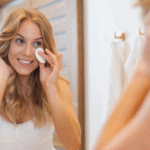Here Comes the Sun: 4 Ways to Protect Your Skin From UV Rays!

Proper skin protection is essential, and not just to keep your skin young in appearance. While it is true that too much sun exposure can increase your chances of premature wrinkles, skin protection is necessary for protecting your health and reducing your risk of skin cancer.
Here are a few skin protection tips to help you fight back against the sun’s harmful UV rays:
- Strategically choose your sunscreen: You already know sunscreen is important for reducing your risk of skin cancer and sunburn. But do you know which SPF is best for protection? If you thought SPF 15, think again. Dermatologists recommend wearing sunscreens with at least an SPF 30, since those are able to block up to 97% of the sun’s UV rays.
- Make hats your best friend: There’s a reason why people wear wide-brimmed hats when they are gardening or fishing, and it’s not because they are a fashion staple. Hats provide shading for the face (including cheeks and chin), ears, and neck, which can help prevent uncomfortable sunburns or dangerous UV rays. Look for hats with broad brims of at least 3-4 inches, and avoid baseball caps, which do not provide protection for the ears, lower cheeks and chin, or neck.
- Watch out for reflections: It doesn’t need to be a sunny day for the sun’s UV rays to find you. Certain surfaces such as our sugary white sand, salt or fresh water, and snow can reflect sunlight and make your exposure to UV rays much more intense. Seek shade when you are outside and remember to protect your eyes with larger-framed sunglasses with UVB and UVA protection.
- Review your medications: Proper skin protection is easier when you have a board-certified dermatologist. If you notice that you are experiencing greater skin sensitivity to the sun, talk to your dermatologist about what could be causing it. In some cases, your medication could be the cause. Around 80% of people experience acne at some point, and certain acne medications can make your skin more sensitive to sun exposure. Other oral medications can make you more sensitive to sunlight, or cause rashes when the skin is exposed to UV light. Talk to your dermatologist about your risk of sunburn and find out if switching medications is right for you.
Now that you have some tips to help block the sun’s harmful rays, are you ready to speak to a board-certified dermatologist to help with your skin protection? Mahoney Dermatology Specialists is the premier dermatology practice that Pinellas County residents trust for optimal skin protection and skin care. To learn more about our dermatology services, or to schedule an appointment, contact Mahoney Dermatology Specialists today!

 Previous Post
Previous Post Next Post
Next Post